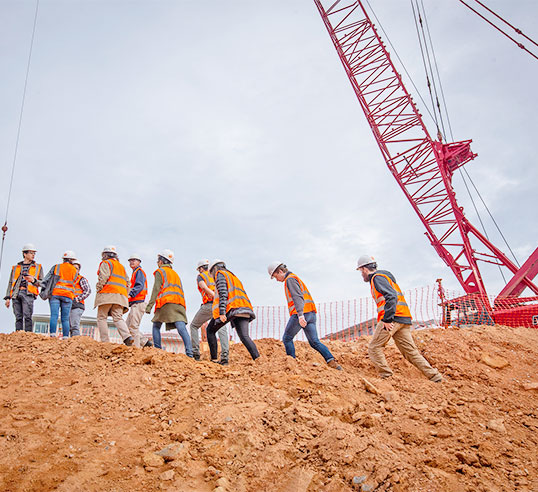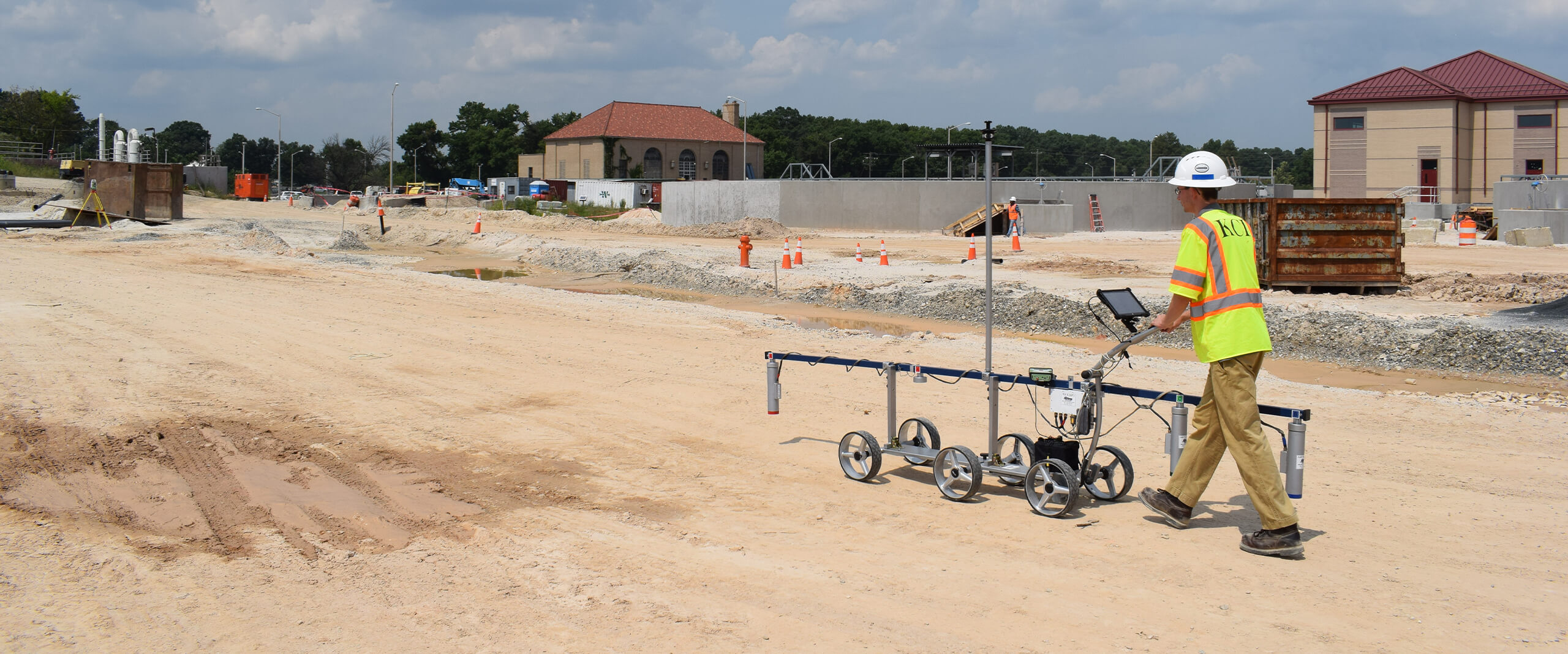Discovering the Benefits of Geo Tech Engineering for Urban Planning
Discovering the Benefits of Geo Tech Engineering for Urban Planning
Blog Article
Understanding the Comprehensive Function of Geotechnical Designers in Ground Examination and Soil Evaluation for Construction Jobs
Geotechnical engineers are essential to the success of building jobs, offering vital insights through comprehensive ground examinations and dirt analysis. Their experience in evaluating dirt behavior and utilizing advanced testing techniques informs essential decisions that maintain architectural honesty and security.
Duty of Geotechnical Engineers
The pivotal duty of geotechnical designers in building and construction projects can not be overstated, as they provide crucial insights right into dirt habits and website problems. These experts are tasked with assessing the viability of the ground for numerous kinds of frameworks, guaranteeing safety and security and stability throughout the construction process. Their proficiency incorporates a variety of activities, consisting of site characterization, soil sampling, and lab screening, which are critical for establishing the physical and mechanical residential or commercial properties of the dirt.
Geotechnical designers use their searchings for to develop fundamental layouts that fit load-bearing needs and mitigate dangers associated with dirt negotiation, incline, and liquefaction stability. They play an essential role in identifying prospective hazards, such as groundwater fluctuations and contamination, which can considerably impact project viability. In addition, they team up with designers, civil engineers, and contractors to ensure that geotechnical factors to consider are integrated right into the total layout and construction phases.
Ground Examination Methods
Ground examination methods create the foundation of geotechnical design, enabling engineers to acquire an extensive understanding of subsurface conditions. These methods are essential for analyzing dirt residential properties, figuring out groundwater levels, and identifying prospective geological risks.
Common methods consist of borehole exploration, which permits the removal of dirt examples at numerous midsts, supplying important data for analysis. In addition, in situ screening strategies, such as Typical Infiltration Tests (SPT) and Cone Infiltration Tests (CPT), are used to review dirt strength and thickness directly in the ground.
Geophysical approaches also play a substantial duty in ground investigations. Strategies such as seismic surveys and electrical resistivity tomography assistance assess subsurface features without substantial excavation. geo tech engineering. These non-invasive approaches are especially valuable in huge or delicate areas where disturbance have to be reduced
Furthermore, exploratory trenches can be dug deep into to aesthetically inspect dirt layers and identify any abnormalities. Each of these techniques adds special understandings, enabling geotechnical designers to establish exact website evaluations and educate design decisions. In recap, a mix of these ground investigation methods is crucial for successful construction jobs, making certain safety and structural integrity.
Dirt Evaluation Techniques
Dirt analysis techniques are critical for understanding the physical and chemical properties of soil, which directly influence the layout and building and construction of foundations and various other structures. Numerous strategies are utilized to evaluate soil characteristics, ensuring that geotechnical designers obtain precise data for educated decision-making.
One generally made use of method is grain dimension evaluation, which identifies the distribution of bit dimensions within a soil example. This is essential for classifying soil kinds and forecasting their habits under load. One more necessary method is Atterberg restrictions screening, which reviews the plasticity and wetness material of fine-grained soils, providing understandings right into their engineering properties.

Field tests, such as Basic Penetration Tests (SPT) and Cone Infiltration Examinations (CPT), offer beneficial in-situ data regarding soil stamina and stratification. Collectively, these soil analysis techniques form the structure of geotechnical examination, enabling designers to create risk-free and efficient frameworks customized to the details conditions of the website.
Risk Mitigation Techniques
Implementing effective danger mitigation approaches is crucial for geotechnical designers to address potential challenges in construction projects. These methods are critical in identifying, assessing, and handling risks related to soil conditions, site security, and groundwater changes, which can negatively influence task end results.
One key method includes performing complete website examinations that utilize advanced geophysical methods and thorough soil tasting. By obtaining precise information on subsurface problems, designers can make educated decisions on design and building approaches. Additionally, using predictive modeling devices permits the simulation of different scenarios, allowing designers to anticipate prospective issues and carry out safety nets.
Furthermore, establishing clear communication channels amongst task stakeholders promotes a collective approach to risk administration. Normal updates and appointments make certain that all celebrations recognize the evolving website problems and can adapt their methods accordingly.

Effect On Building And Construction Projects
The effectiveness of danger mitigation strategies straight affects the total success of construction tasks. Geotechnical designers play a critical role in this domain name, as their expertise in ground examination and soil analysis educates important decisions throughout the building procedure. By properly assessing dirt problems and determining potential threats, these specialists allow project teams to develop effective services that minimize dangers connected with ground instability, water seepage, and various other geotechnical difficulties.
The impact of thorough geotechnical analysis is evident in numerous facets of construction projects, consisting of price monitoring, job timelines, and structural integrity. Early recognition of concerns permits prompt interventions, lessening expensive hold-ups and budget overruns. Moreover, an extensive understanding of site conditions boosts the design and engineering procedure, ensuring that frameworks are constructed to endure ecological pressures and possible all-natural calamities.
Eventually, the payments of geotechnical designers are integral to the successful execution of construction jobs. Their work not only cultivates safety and compliance with regulations yet also boosts the long-term sustainability of frameworks, making certain that they carry out efficiently throughout their designated life-span. The partnership between various other stakeholders and geotechnical groups is crucial for attaining ideal end results in construction undertakings.
Conclusion
In verdict, geotechnical engineers do a vital function in building tasks through detailed ground investigations and dirt analyses. Their knowledge in evaluating dirt actions, using different examination techniques, and applying risk reduction techniques considerably adds to the structural integrity and security of built atmospheres. By teaming up with multidisciplinary teams, these specialists enhance task efficiency and make certain conformity with security criteria, eventually leading to effective find more info construction end results and decreased possible hazards.
Geotechnical engineers are important to the success of building tasks, offering crucial insights via extensive ground examinations and dirt evaluation.The crucial role of geotechnical engineers in building tasks can not be overemphasized, as they give necessary insights into soil habits and site conditions. Their proficiency encompasses a wide array of tasks, consisting of site characterization, soil sampling, and laboratory testing, which are critical for identifying the mechanical and physical properties of the soil.
By properly assessing dirt problems and identifying prospective dangers, these professionals make it possible for project teams to create reliable remedies that minimize risks linked with ground instability, water infiltration, and other geotechnical challenges.
In conclusion, geotechnical engineers do an essential feature in building projects with detailed ground examinations and soil evaluations.
Report this page